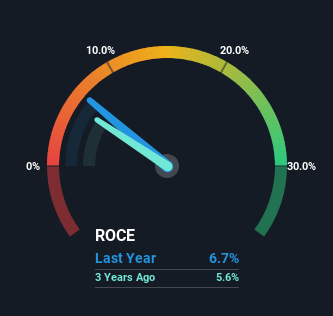Restaurant Brands New Zealand (NZSE:RBD) May Have Issues Allocating Its Capital
If you're not sure where to start when looking for the next multi-bagger, there are a few key trends you should keep an eye out for. In a perfect world, we'd like to see a company investing more capital into its business and ideally the returns earned from that capital are also increasing. This shows us that it's a compounding machine, able to continually reinvest its earnings back into the business and generate higher returns. In light of that, when we looked at Restaurant Brands New Zealand (NZSE:RBD) and its ROCE trend, we weren't exactly thrilled.
Return On Capital Employed (ROCE): What Is It?
For those who don't know, ROCE is a measure of a company's yearly pre-tax profit (its return), relative to the capital employed in the business. The formula for this calculation on Restaurant Brands New Zealand is:
Return on Capital Employed = Earnings Before Interest and Tax (EBIT) ÷ (Total Assets - Current Liabilities)
0.067 = NZ$85m ÷ (NZ$1.4b - NZ$166m) (Based on the trailing twelve months to December 2023).
Thus, Restaurant Brands New Zealand has an ROCE of 6.7%. On its own that's a low return on capital but it's in line with the industry's average returns of 7.4%.
View our latest analysis for Restaurant Brands New Zealand
In the above chart we have measured Restaurant Brands New Zealand's prior ROCE against its prior performance, but the future is arguably more important. If you'd like to see what analysts are forecasting going forward, you should check out our free analyst report for Restaurant Brands New Zealand .
What Can We Tell From Restaurant Brands New Zealand's ROCE Trend?
When we looked at the ROCE trend at Restaurant Brands New Zealand, we didn't gain much confidence. Around five years ago the returns on capital were 17%, but since then they've fallen to 6.7%. Meanwhile, the business is utilizing more capital but this hasn't moved the needle much in terms of sales in the past 12 months, so this could reflect longer term investments. It may take some time before the company starts to see any change in earnings from these investments.
What We Can Learn From Restaurant Brands New Zealand's ROCE
In summary, Restaurant Brands New Zealand is reinvesting funds back into the business for growth but unfortunately it looks like sales haven't increased much just yet. And investors appear hesitant that the trends will pick up because the stock has fallen 56% in the last five years. Therefore based on the analysis done in this article, we don't think Restaurant Brands New Zealand has the makings of a multi-bagger.
One more thing: We've identified 3 warning signs with Restaurant Brands New Zealand (at least 1 which is a bit unpleasant) , and understanding them would certainly be useful.
While Restaurant Brands New Zealand may not currently earn the highest returns, we've compiled a list of companies that currently earn more than 25% return on equity. Check out this free list here.
Have feedback on this article? Concerned about the content? Get in touch with us directly. Alternatively, email editorial-team (at) simplywallst.com.
This article by Simply Wall St is general in nature. We provide commentary based on historical data and analyst forecasts only using an unbiased methodology and our articles are not intended to be financial advice. It does not constitute a recommendation to buy or sell any stock, and does not take account of your objectives, or your financial situation. We aim to bring you long-term focused analysis driven by fundamental data. Note that our analysis may not factor in the latest price-sensitive company announcements or qualitative material. Simply Wall St has no position in any stocks mentioned.

 Yahoo Finance
Yahoo Finance 
